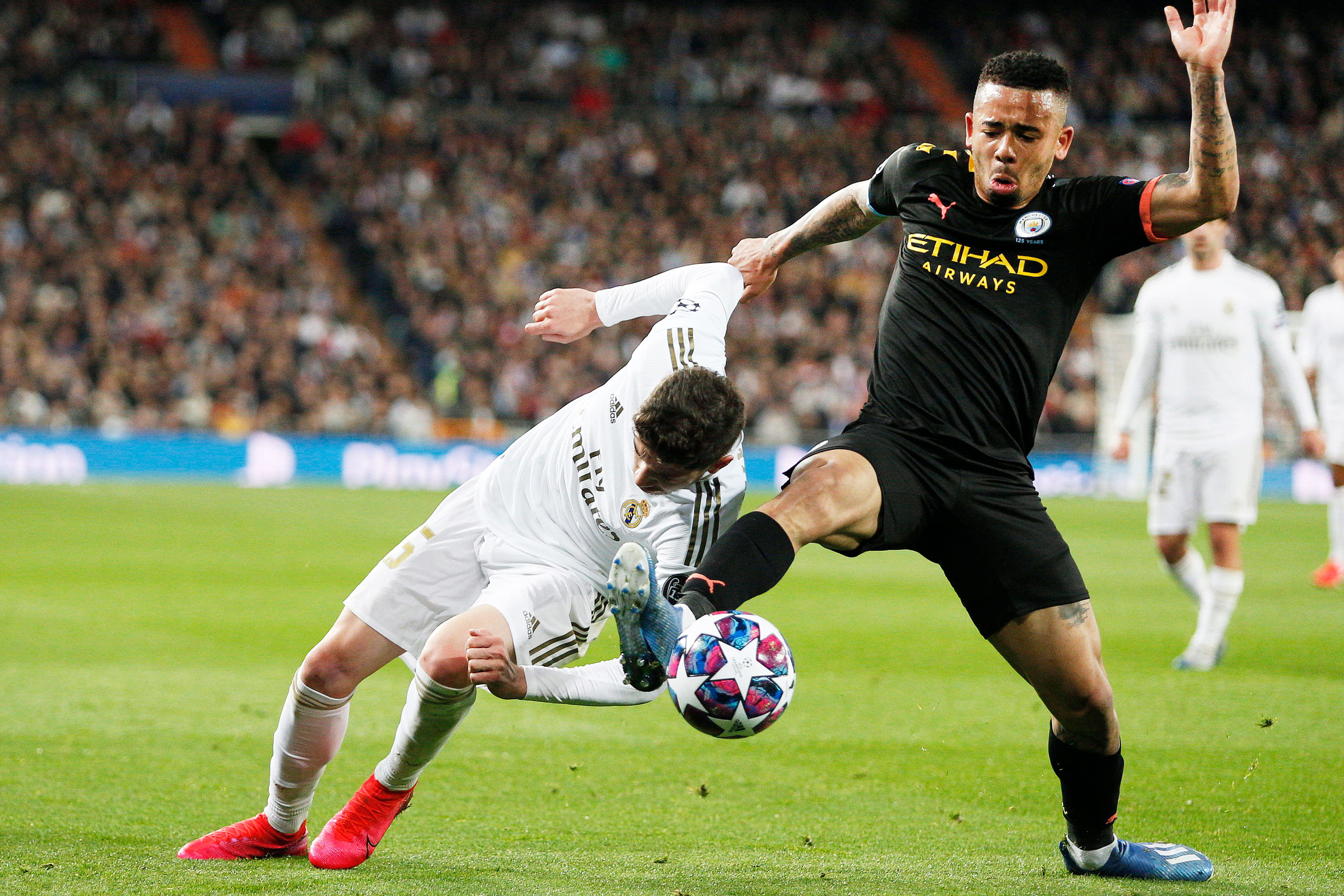Streaming giants could win big as soccer community reels over Super League split

Gabriel Jesus of Manchester City and Real Madrid CF’s Fede Valverde competes for the ball during the UEFA Champions League match, round of 16 first leg between Real Madrid and Manchester City at Santiago Bernabeu Stadium. (Photo by Manu Reino / SOPA Images/Sipa USA)(Sipa via AP Images)
Manu Reino | SOPA Images | Sipa USA via AP Images
The power struggle upending European soccer has drawn widespread criticism from former players, pundits and politicians. Now, it could reshape the broadcast rights deals that underpin the multi-billion dollar industry.
“Audiences are decreasing, rights are decreasing, and something had to be done,” European Super League (ESL) Chairman Florentino Perez told Spanish television show El Chiringuito de Jugones on Monday.
“Whenever there is a change, there are always people who oppose it… and we are doing this to save football at this critical moment,” Perez, who also serves as President of Real Madrid, said, laying down the gauntlet for what could be a long and complex battle over broadcast rights.
Announced on Sunday, the ESL was set up with twelve of Europe’s wealthiest teams in a bid to rival the UEFA Champions League format, which is currently Europe’s top annual club competition. UEFA President Aleksander Ceferin slammed the Super League as a “disgraceful, self serving proposal” and a “spit in the face” for fans.
UEFA takes in nearly $4 billion a year from media rights across all of its competitions, according to its latest financial report. Broadcast rights made up more than 85% of total revenue, followed by commercial rights (12.8%) and tickets and hospitality fees (1.3%).
“Once you get a fight between the UEFA Champions League and the European Super League, then you’re effectively competing for the same slot on a Wednesday night, 8 p.m. European time, which is going to have an impact on the prices that people are willing to pay,” James Walton, sports business group leader at Deloitte told CNBC’s Capital Connection on Tuesday.
“Nobody knows yet who they’re going to go to try to sell these TV rights, but the early names that are being thrown in the mix are some of the online providers: Disney, Amazon and Netflix,” he said.
Reacting to change
The Financial Times reported on Monday that ESL organizers had held early discussions with Facebook, Amazon, Disney and Comcast-owned Sky to secure broadcast deals, without elaborating on the discussions.
Facebook said on Monday it is not in talks to acquire broadcasting rights, according to a Reuters report. While Amazon has secured exclusive rights to screen Champions League matches in Italy and Germany from 2021 to 2024, sources say it’s not in discussions with the European Super League at this time.
Meanwhile, other broadcasters are distancing themselves from the spat. “We have not been involved in any discussions with the proposed breakaway European Super League,” Sky said in a statement to CNBC.
Others, including U.K. pay-TV broadcaster, BT Sport, which paid $2.2 billion to retain the exclusive broadcast rights to the Champions League through 2024, have condemned the plan saying the breakaway group could undermine existing contracts and threaten the future of the sport.
“BT recognises the concerns raised by many of football’s leading voices and fans, and believes the formation of a European Super League could have a damaging effect to the long term health of football in this country,” BT said in a statement to CNBC.
Broadcast cash cow
Rights to show the lucrative games are hard fought between broadcasters globally, who use the content to generate advertising and subscription revenue. However, as consumption and advertising habits rapidly change, analysis by Deloitte says sports fans are looking for more technologically advanced and personalized solutions to deliver high-quality content, at the right time and through the right channel.
“We don’t know yet who the broadcaster is, or if there are any signed up to be on board, but we would expect it to be some form of over-the-top streaming provider looking to package this sport in different ways,” said Daniel Plumley, a senior lecturer at Sheffield Hallam University who specializes in English professional soccer.
“It’s no coincidence to me that the timing of this announcement is linked around the pandemic,” Plumley added. “We know football (soccer) clubs are struggling, even the bigger ones, and as in any sort of wider economic situation, the bigger players in the market look to capitalize at times of recession or times of financial hardship,” he said.
Analysts say rival broadcast packages could be worth hundreds of millions a year, as shifting advertising and viewer trends and the impact of the pandemic push viewers further away from traditional linear television to streaming platforms.
“Both sides seem to be in this fight for the long haul,” Walton said. “You can expect every day for the next couple of weeks, there are going to be developments on this story.”
Disclosure: Comcast, which owns CNBC parent NBCUniversal, is the owner of Sky.
Correction: Florentino Perez’s title was updated to correctly reflect his role as European Super League (ESL) chairman.




